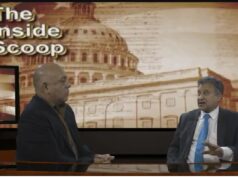So far, the commentary I’ve seen regarding the death of former Senator Harry F. Byrd, Jr. has ranged from bland to boilerplate to bizarre. Sen. Mark Warner fell mostly into the first two categories, issuing a VERY short statement praising Byrd’s “commitment to fiscal accountability,” and noting that “when Sen. Byrd and I occasionally agreed to disagree, he always was a gentleman about it.” Uh huh. Ditto for Sen. Tim Kaine, who also issued a short statement, praising Byrd’s “civil manner and commitment to public service,” but not getting into any substance regarding Byrd’s record. And Gov. Bob McDonnell issued a statement that’s a bit longer, but still manages to not say much, other than biographical information (ignoring the bad stuff) and how “we’ve lost a good and decent person and a dedicated public servant,” one “rightly known for his civility, candor and wit.” In fairness, the Warner, Kaine and McDonnell statements appear to be nothing more than attempts to say something – anything – nice about someone who just passed away. That’s fine, for the most part.
Then there was this bizarre statement from former Sen. George Allen, who somehow managed to call the underachieving, segregationist Byrd, Jr. “one of the most influential, respected and principled leaders of the 20th Century” (I bet we could quickly come up with a list of several hundred – thousand? – more “influential…leaders of the 20th Century” in America) lauding his “consistent, sound and unflinching leadership in working to achieve the ideal of a wise and frugal government.”
None of those statements by Allen, of course, come even remotely close to the truth of the Byrd, Jr. (and Byrd family in general) legacy, including his never-renounced support for segregation and “Massive Resistance” (to school integration). Who knows what Allen’s thinking, exactly, but consider who we’re talking about here: a man who used a racist slur towards an Asian-American in the 2006 campaign; who habitually used the “n word” and even shoved a severed deer head in a black man’s mailbox as a sick “prank” of some sort, who claimed that mentioning his Jewish heritage was casting “aspersions” on him (as if there’s something bad about having a Jewish heritage), etc, etc. Should we, therefore, be surprised that Allen would feel the way he does about Harry F. Byrd, Jr? Obviously not.
So, that’s three bland/boilerplate statements (from Senators Warner and Kaine and Gov. McDonnell), plus one (predictably) loony one (from former Senator George Allen), and a lot of silence from most other Virginia elected officials. How about something intelligent? For that, we’ve got to turn to the straight news articles, which noted Byrd, Jr.’s strong support for segregation, and to Bacon’s Rebellion blogger Peter Galuszka, who has some choice words for Byrd, Jr. specifically, and for the Byrd machine in general.
One of the most important figures who defined much of what was wrong with Virginia in the 20th century has died at age 98.
more on the “flip”
Harry F. Byrd Jr., the son of the man who set up the one-party system of control in the state…was a three-term U.S. Senator best known for supporting Massive Resistance against court-ordered school integration and maintaining a limited government dogma that gave Virginia attractively low taxes but has starved the state for revenues as it grew.
Otherwise, Byrd, who grew up as a child of the privileged elite partly in the Richmond Executive Mansion where his famous father was governor, did little…introducing very few bills on Capitol Hill, other than ones supporting a rollback of a moratorium of chromium ore controlled by the white-controlled government of Rhodesia and letting the late Confederate General Robert E. Lee become an American citizen again.
A sad legacy, in other words, and one that we still need to work on moving past in the 21st century.
In the end, Harry F. Byrd, Jr. marked a transition phase, during which the segregationist “Dixiecrats” shifted away from the Democratic Party – overwhelmingly becoming Republicans (or in Byrd Jr.’s case, an independent) – while the previously strong, progressive (on things like the income tax, estate tax, the New Deal rural anti-poverty programs, civil rights, etc.) Republican tradition rapidly met its demise. Sad to say, but Harry F. Byrd, Jr. basically kept many of the negative aspects of the Dixiecrats, without the positive, progressive tradition of a sizable segment of his former party. That’s not a legacy to celebrate, as George Allen does, but it’s certainly a part of our history that we need to be aware of…













![Video: Sen. Mark Warner Says Last Night, “you saw an angry old man [Trump] giving a partisan screech that doesn’t solve anything”](https://bluevirginia.us/wp-content/uploads/2025/12/warner1218-100x75.jpg)

